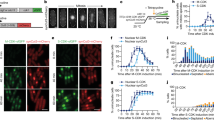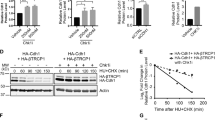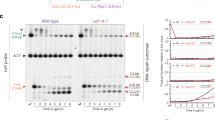Abstract
Cyclin-dependent kinases (CDKs) limit the activation of DNA replication origins to once per cell cycle by preventing the assembly of pre-replicative complexes (pre-RCs) during S, G2 and M phases of the cell cycle in the budding yeast Saccharomyces cerevisiae1,2. CDKs inhibit each pre-RC component (ORC, Cdc6, Cdt1/Mcm2-7) by different mechanisms. We show here that the mitotic CDK, Clb2/Cdc28, binds tightly to an amino-terminal domain (NTD) of Cdc6, and that Cdc6 in this complex is unable to assemble pre-RCs. We present evidence indicating that this Clb2-dependent mechanism contributes to preventing re-replication in vivo. CDK interaction with the NTD of Cdc6 is mediated by the cyclin subunit Clb2, and could be reconstituted with recombinant Clb2 protein and synthetic NTD peptides. Tight Clb2 binding occurred only when the NTD was phosphorylated on CDK consensus sites. Human CDKs containing cyclins A, B and E also bound specifically to phospho-NTD peptides. We propose that direct binding of cyclins to phosphopeptide motifs may be a widespread phenomenon contributing to the targeting of CDKs to substrates.
This is a preview of subscription content, access via your institution
Access options
Subscribe to this journal
Receive 51 print issues and online access
$199.00 per year
only $3.90 per issue
Buy this article
- Purchase on Springer Link
- Instant access to full article PDF
Prices may be subject to local taxes which are calculated during checkout




Similar content being viewed by others
References
Diffley, J. F. X. Regulation of early events in chromosome replication. Curr. Biol. 14, 778–786 (2004)
Bell, S. P. & Dutta, A. DNA replication in eukaryotic cells. Annu. Rev. Biochem. 71, 333–374 (2002)
Seki, T. & Diffley, J. F. X. Stepwise assembly of initiation proteins at budding yeast replication origins in vitro. Proc. Natl Acad. Sci. USA 97, 14115–14120 (2000)
Arion, D., Meijer, L., Brizuela, L. & Beach, D. cdc2 is a component of the M phase-specific histone H1 kinase: evidence for identity with MPF. Cell 55, 371–378 (1988)
Dunphy, W. G., Brizuela, L., Beach, D. & Newport, J. The Xenopus cdc2 protein is a component of MPF, a cytoplasmic regulator of mitosis. Cell 54, 423–431 (1988)
Drury, L. S., Perkins, G. & Diffley, J. F. X. The Cdc4/34/53 pathway targets Cdc6p for proteolysis in budding yeast. EMBO J. 16, 5966–5976 (1997)
Elsasser, S., Lou, F., Wang, B., Campbell, J. L. & Jong, A. Interaction between yeast Cdc6 protein and B-type cyclin/Cdc28 kinases. Mol. Biol. Cell 7, 1723–1735 (1996)
Weinreich, M., Liang, C., Chen, H. H. & Stillman, B. Binding of cyclin-dependent kinases to ORC and Cdc6p regulates the chromosome replication cycle. Proc. Natl Acad. Sci. USA 98, 11211–11217 (2001)
Archambault, V. et al. Genetic and biochemical evaluation of the importance of Cdc6 in regulating mitotic exit. Mol. Biol. Cell 14, 4592–4604 (2003)
Piatti, S., Bohm, T., Cocker, J. H., Diffley, J. F. X. & Nasmyth, K. Activation of S-phase promoting CDKs in late G1 defines a “point of no return” after which Cdc6 synthesis cannot promote DNA replication in yeast. Genes Dev. 10, 1516–1531 (1996)
Desdouets, C. et al. Evidence for a Cdc6p-independent mitotic resetting event involving DNA polymerase α. EMBO J. 17, 4139–4146 (1998)
Perkins, G., Drury, L. S. & Diffley, J. F. X. Separate SCFCDC4 recognition elements target Cdc6 for proteolysis in S phase and mitosis. EMBO J. 20, 4836–4845 (2001)
Nguyen, V. Q., Co, C. & Li, J. J. Cyclin-dependent kinases prevent DNA re-replication through multiple mechanisms. Nature 411, 1068–1073 (2001)
Wilmes, G. M. et al. Interaction of the S-phase cyclin Clb5 with an ‘RXL’ docking sequence in the initiator protein Orc6 provides an origin-localized replication control switch. Genes Dev. 18, 981–991 (2004)
Adams, P. D. et al. Retinoblastoma protein contains a C-terminal motif that targets it for phosphorylation by cyclin-cdk complexes. Mol. Cell. Biol. 19, 1068–1080 (1999)
Chen, J., Saha, P., Kornbluth, S., Dynlacht, B. D. & Dutta, A. Cyclin-binding motifs are essential for the function of p21CIP1. Mol. Cell. Biol. 16, 4673–4682 (1996)
Drury, L. S., Perkins, G. & Diffley, J. F. X. The cyclin dependent kinase Cdc28p regulates distinct modes of Cdc6p proteolysis during the budding yeast cell cycle. Curr. Biol. 10, 231–240 (2000)
Pawson, T. Specificity in signal transduction: from phosphotyrosine-SH2 domain interactions to complex cellular systems. Cell 116, 191–203 (2004)
Elia, A. E. et al. The molecular basis for phosphodependent substrate targeting and regulation of Plks by the Polo-box domain. Cell 115, 83–95 (2003)
Cheng, K. Y., Lowe, E. D., Sinclair, J., Nigg, E. A. & Johnson, L. N. The crystal structure of the human polo-like kinase-1 polo box domain and its phosphopeptide complex. EMBO J. 22, 5757–5768 (2003)
Durocher, D. et al. The molecular basis of FHA domain:phosphopeptide binding specificity and implications for phospho-dependent signaling mechanisms. Mol. Cell 6, 1169–1182 (2000)
Halford, K. A. Biochemical Analysis of Yeast Pre-Replicative Complex Assembly. Thesis, Univ. College London (2003)
Li, J. J. & Kelly, T. J. Simian virus 40 DNA replication in vitro. Proc. Natl Acad. Sci. USA 81, 6973–6977 (1984)
Acknowledgements
We are grateful to members of our laboratory for discussions and for critical reading of the manuscript. We are also grateful to J. Gannon and T. Hunt for discussions as well as human CDK antibodies and p13suc1 beads. We thank L. Drury, K. Labib, J. Li, G. Perkins and S. Reed for yeast strains. We also thank N. O'Reilly and the Peptide Synthesis Facility at the London Research Institute. This work was supported by Cancer Research UK and the Human Frontier Science Program Organization. S.M. is supported by JSPS postdoctoral Fellowships for Research Abroad.
Author information
Authors and Affiliations
Corresponding author
Ethics declarations
Competing interests
The authors declare that they have no competing financial interests.
Rights and permissions
About this article
Cite this article
Mimura, S., Seki, T., Tanaka, S. et al. Phosphorylation-dependent binding of mitotic cyclins to Cdc6 contributes to DNA replication control. Nature 431, 1118–1123 (2004). https://doi.org/10.1038/nature03024
Received:
Accepted:
Published:
Issue Date:
DOI: https://doi.org/10.1038/nature03024
This article is cited by
-
Evolutionary conservation of the CDK targets in eukaryotic DNA replication initiation
Chromosoma (2015)
-
Cks confers specificity to phosphorylation-dependent CDK signaling pathways
Nature Structural & Molecular Biology (2013)
-
GEMC1 is a TopBP1-interacting protein required for chromosomal DNA replication
Nature Cell Biology (2010)
-
DNA replication licensing control and rereplication prevention
Protein & Cell (2010)
-
Regulation of the initiation step of DNA replication by cyclin-dependent kinases
Chromosoma (2010)
Comments
By submitting a comment you agree to abide by our Terms and Community Guidelines. If you find something abusive or that does not comply with our terms or guidelines please flag it as inappropriate.



